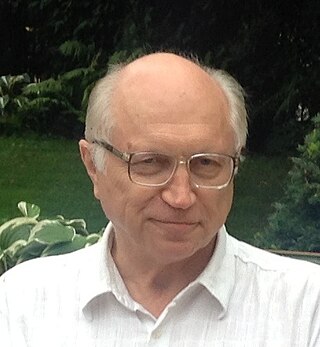
In linguistics and related fields, pragmatics is the study of how context contributes to meaning. The field of study evaluates how human language is utilized in social interactions, as well as the relationship between the interpreter and the interpreted. Linguists who specialize in pragmatics are called pragmaticians. The field has been represented since 1986 by the International Pragmatics Association (IPrA).
A punch line concludes a joke; it is intended to make people laugh. It is the third and final part of the typical joke structure. It follows the introductory framing of the joke and the narrative which sets up for the punch line.
In an English-speaking country, Standard English (SE) is the variety of English that has undergone substantial regularisation and is associated with formal schooling, language assessment, and official print publications, such as public service announcements and newspapers of record, etc. All linguistic features are subject to the effects of standardisation, including morphology, phonology, syntax, lexicon, register, discourse markers, pragmatics, as well as written features such as spelling conventions, punctuation, capitalisation and abbreviation practices. SE is local to nowhere: its grammatical and lexical components are no longer regionally marked, although many of them originated in different, non-adjacent dialects, and it has very little of the variation found in spoken or earlier written varieties of English. According to Peter Trudgill, Standard English is a social dialect pre-eminently used in writing that is distinguishable from other English dialects largely by a small group of grammatical "idiosyncrasies," such as irregular reflexive pronouns and an "unusual" present-tense verb morphology.
Interculturalism is a political movement that supports cross-cultural dialogue and challenging self-segregation tendencies within cultures. Interculturalism involves moving beyond mere passive acceptance of multiple cultures existing in a society and instead promotes dialogue and interaction between cultures. Interculturalism is often used to describe the set of relations between indigenous and western ideals, grounded in values of mutual respect.

Dirk Geeraerts is a Belgian linguist. He is professor emeritus of theoretical linguistics at the University of Leuven, Belgium. He is the founder of the research unit Quantitative Lexicology and Variational Linguistics (QLVL). His main research interests involve the overlapping fields of lexical semantics, lexicology, and lexicography, with a theoretical focus on cognitive semantics. His involvement with cognitive linguistics dates from the 1980s, when in his PhD thesis he was one of the first in Europe to explore the possibilities of a prototype-theoretical model of categorization. As the founder of the journal Cognitive Linguistics and as the editor of the Oxford Handbook of Cognitive Linguistics, he played an instrumental role in the international expansion of cognitive linguistics. Geeraerts is one of the outspoken advocates of the implementation of empirical methodologies, such as corpus linguistics in cognitive linguistic research. He also argues for the involvement of more pragmatic elements such as contextual factors, lectal variation, and language history that influence the construal of word meanings and the choice of lexical items for concepts.
The Wutun language is a Chinese–Tibetan–Mongolian creole language. It is spoken by about 4,000 people, most of whom are classified as Monguor (Tu) by the Chinese government. Wutun speakers reside in two villages of Tongren County, eastern Qinghai province, China. It is also known as the Ngandehua language.

Intercultural learning is an area of research, study and application of knowledge about different cultures, their differences and similarities. On the one hand, it includes a theoretical and academic approach. On the other hand, it comprises practical applications such as learning to negotiate with people from different cultures, living with people from different cultures, living in a different culture and the prospect of peace between different cultures.
Wolfgang U. Dressler is a Austrian professor of linguistics at the University of Vienna. Dressler is a polyglot and scholar who has contributed to various fields of linguistics, especially phonology, morphology, text linguistics, clinical linguistics and child language development. He is an important representative of the 'naturalness theory'.
Curtis Scott Jacobs, , is an American argumentation, communication, and rhetorical scholar.
István Kecskés is a Distinguished Professor of the State University of New York, USA. He teaches graduate courses in pragmatics, second language acquisition and bilingualism at SUNY, Albany. He is the President of the American Pragmatics Association (AMPRA) and the CASLAR Association. He is the founder and co-director of the Barcelona Summer School on Bi- and Multilingualism, and the founder and co-director of Sorbonne, Paris – SUNY, Albany Graduate Student Symposium (present).
English as a lingua franca (ELF) is the use of the English language "as a global means of inter-community communication" and can be understood as "any use of English among speakers of different first languages for whom English is the communicative medium of choice and often the only option". ELF is "defined functionally by its use in intercultural communication rather than formally by its reference to native-speaker norms" whereas English as a second or foreign language aims at meeting native speaker norms and gives prominence to native-speaker cultural aspects. While lingua francas have been used for centuries, what makes ELF a novel phenomenon is the extent to which it is used in spoken, written and in computer-mediated communication. ELF research focuses on the pragmatics of variation which is manifest in the variable use of the resources of English for a wide range of globalized purposes, in important formal encounters such as business transactions, international diplomacy and conflict resolution, as well as in informal exchanges between international friends.
Lodz Papers in Pragmatics is a Polish linguistics journal owned by the University of Łódź and was previously published by Versita Open. The journal was launched in 2012. The founder is Piotr Cap. It is published biannually by De Gruyter. It is available gratis on the internet. The journal is peer-reviewed and focuses on pragmatics.
Farzad Sharifian was a pioneer of cultural linguistics and held the Chair in Cultural Linguistics at Monash University. He developed a theoretical and an analytical framework of cultural cognition, cultural conceptualisations, and language, which draw on and expands the analytical tools and theoretical advancements in several disciplines and sub-disciplines, including cognitive psychology, anthropology, distributed cognition, and complexity science. The theoretical/analytical frameworks and their applications in several areas of applied linguistics including intercultural communication, cross-cultural/intercultural pragmatics, World Englishes, Teaching English as an International Language (TEIL), and political discourse analysis are the subject of Sharifian’s monographs entitled Cultural Conceptualisations and Language and Cultural Linguistics. These books have widely been recognised as laying "solid theoretical and analytical grounds for what can be recognised as Cultural Linguistics"..
Asiacentrism is an ethnocentric and economic perspective that regards Asia to be either superior, central, or unique relative to other regions. This ideological stance may take the form of ascribing to Asia significance or supremacy at the cost of the rest of the world. The concept arose in the context of a projected Asian Century, the expected economic and cultural dominance of Asia in the 21st century, in the 1990s.

Andrzej Aleksander Włodarczyk, known as André Wlodarczyk, is a Polish-French linguist.
Barbara Kenyon Abbott is an American linguist. She earned her PhD in linguistics in 1976 at the University of California at Berkeley under the supervision of George Lakoff. From 1976 to 2006, she was a professor in the department of linguistics and Germanic, Slavic, Asian, and African languages at Michigan State University, with a joint appointment in philosophy. She is now a Professor Emerita.
Alessandro Capone is an Italian linguist. He is full professor of linguistics at the University of Messina
Laura Miller is an American anthropologist and the Ei'ichi Shibusawa-Seigo Arai Endowed Professor of Japanese Studies and Professor of History at the University of Missouri–St. Louis. She held various academic positions and jobs in both the United States and Japan before accepting this named chair in 2010.

Marta Dynel is a Polish linguist and professor at Łódź University, Poland. She is known for her works on pragmatics and is the editor-in-chief of the journal Lingua.
In linguistics, exhaustivity is the phenomenon where a proposition can be strengthened with the negation of certain alternatives. For example, in response to the question "Which students got an A?", the utterance "Ava got an A" has an exhaustive interpretation when it conveys that no other students got an A. It has a non-exhaustive interpretation when it merely conveys that Ava was among the students who got an A.





